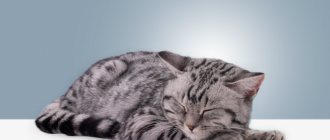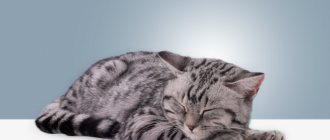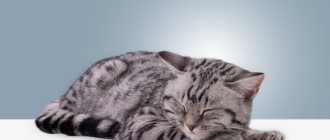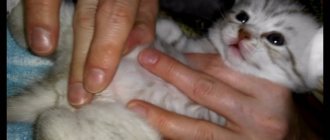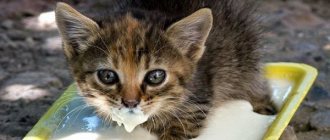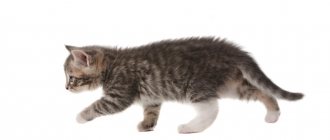Boredom
This disease most often affects cats kept at home. There is no need to search and fight for food. Fight for survival, proving your worth? No need either. Boring! Play with the owner? Oh, how rarely does this happen. And cats begin to follow on the heels of domestic cats - just like that, out of banal boredom. You have to put yourself somewhere! Even sleep doesn’t help anymore.
Such a problem, if it exists, is treated simply. Spend time with your pet, at least fifteen to twenty minutes a day, after work! Play some simple games, at least move a candy wrapper on a string.
Well, what if everything is in order with leisure time in your family, but the cat continues to step on your heels? Leave everything as it is – take it as a compliment from the cat’s side!
Photo: bistrolilly.com.au (from open sources).
How to deal with a cat screaming at night - instructions
When a cat, who until recently behaved completely calmly, begins to scream at night, the first thing to do is show him to an experienced veterinarian. Only a specialist can help you understand the reasons for your pet’s restless behavior.
If your unneutered cat screams at night, what to do in this case is dictated by simple logic: let the poor guy go free. True, there are products on sale that help cope with sexual desire. However, they can only be used as an exception, since they can cause serious damage to your pet’s health. In the future, it is advisable to neuter the cat in order to once and for all protect yourself from sleepless nights, and protect your pet from injury and even death.
And if a castrated cat screams at night, what should you do then? Perhaps not much time has passed since the operation and the hormonal changes in the body have not yet completed. Only patience can help here. Soon the nightly shouting should stop.
But it also happens that in the middle of the night a sterilized cat, who has forgotten even to think about breeding, suddenly starts screaming. Most likely, she just got bored. If you have other pets, they will quickly call the night owl to order. All you have to do is arm yourself with a ball or string and play a little with your pet. Of course, you won’t do this every night; you also need to rest. The best way out is to play properly before bed, then your furry fidget will sleep very soundly.
Signs of separation anxiety in cats
Cat separation anxiety appears only in cases where they try to separate the pet from a person or other animals to which the cat is strongly attached. As a result, the cat will do everything possible to stay near the owner as much as possible, which answers the question: Why is the cat chasing me?
If your pet notices that you are about to leave the house, he will get angry, hide, or simply stand between you and the door. Upon the owner's return, the cat will literally go crazy with happiness.
Separation syndrome occurs just as easily in cats as it does in dogs. So, the pet will vocalize loudly and may even make a pile or puddle near the door or on things that belong to its owner. In some cases, subtle signs may indicate the development of separation anxiety. For example, if a cat is left alone, it stops eating or vomits.
The most rare symptom is excessive licking to the point that bald spots appear on the pet's body.
Why does a cat follow its owner's heels?
It is impossible to accurately answer the question: experts suggest that genetic factors, as well as the environment, play an important role in this situation. So, if a kitten was orphaned early or was taken from its mother, then it has a predisposition to developing such a disease.
If you suspect this type of abnormality in your pet, then the best solution would be to contact a veterinarian and subsequently conduct a full examination of the cat’s health. After all, the main task is to make sure that all this did not arise due to health problems.
For example, if a cat constantly and vigorously licks itself, then it may be allergic to a particular product. The specialist will be able to recommend that you do a urine test, a blood test, a test for thyroid hormones, biochemistry, and also check your blood pressure.
How to cure separation anxiety?
The most effective therapy for cats is to ignore your pet for 10 minutes before and after you leave the house. You can distract your cat with some interesting toy. So, a great solution would be to order a toy with treats inside, which will spill out when playing with it.
Try to distract your pet by hiding goodies in different parts of the apartment. In addition, all your cat’s favorite toys must be taken out before you leave and hidden after returning home.
Make the environment as interesting and fun as possible. Set up a comfortable place where you can look out the window or at the birds, and also order a scratching post or some kind of entertaining climbing frame.
Is your cat or cat following you around?
My two cats work very well as guides for me. Wherever I go, they will always lead me to the kitchen, show me where the refrigerator is and their empty bowl stands alone. For some reason they don’t take me to other places at all.(((
I have a cat. Follows around periodically. He loves to sit and lie on the carpet when I sit next to me on a chair, at a table, at a computer. And the dog lies down on the sofa. We sit together mentally))) The cat sometimes follows me when he wants to eat or for me to brush him, he loves this process.
Mine personally follows me on my heels, I go to the computer, she follows me and sits next to me, I go to another place, she goes there too. Often, when Maa feeds her in the morning, she goes to lie down at my feet and continue to sleep. She loves to see me, although I don’t feed her often, unlike my mother. And if I do feed it, it’s usually chips, ice cream, crackers, sometimes cake, roll
By the way, this can be used for good - take funny photos or shoot funny videos with her, her tricks))) And upload them to hosting sites like YouTube))) And for the future, a good memory, and you will have income) - 4 years ago
I don't have my own cat. But my friend has one... one might even say that it is common. One for all her friends))) I don’t know how he behaves when he’s alone with her, but he always follows guests, looks into their eyes, listens to conversations. He probably makes sure that they behave well, that they don’t play with his toys and don’t eat too much)))
No. Well, or very rarely. Our cat is independent and doesn’t bother us much. He eats in the morning and sleeps somewhere all day. More active in the evening (I’m used to no one being home until the evening). He has favorite places to relax, for example, a sports corner.
And we removed the carpets and rugs, but damn it likes to sit on the sofa and on clean linen, Raganza. The main thing is that it is clean. But what’s interesting is that there are parts on my things
Source
Behavioral problems in cats. Why does a cat meow often?
Cats meowing is completely natural, it’s how cats communicate with us. But it often happens that a cat begins to “use” meowing to beg for food, to demand affection, and simply to disturb sleep at night... What to do if your cat has learned to blackmail you with screams and meows?
Most often, behavioral problems associated with persistent meowing in cats affect young cats between six months and 1 year of age. Cats aged 7-8 years bring owners much fewer problems.
If a cat begins to meow at night in old age, this may be a sign of illness in the cat. However, the main cause of behavioral problems in older cats is lack of attention. As a cat ages, it needs your attention and affection more and more. How does she achieve this? Naturally, meowing at night, meowing near a closed door.
Young or adult cats may bother you with their meows because they cannot get used to the daily routine or rules of behavior, perhaps the cat is under stress. But they solve this problem quickly.
Old cats most often cause trouble with their nighttime screams that prevent you from falling asleep. In the first few days or even weeks, you will likely find yourself approaching your cat, worrying that something is wrong with her. But, as a rule, you will find that the cat is not in pain or bothered by anything. The cat just wants...your attention, so that you come and pet her.
In their youth, cats are surprisingly arrogant and independent and withdraw from humans. With age, the cat realizes that now a lot depends on you and this makes it become more friendly and dependent on you.
In old age, the cat cedes important decisions to you, for example, “Should I go for a walk?”
Common language with a cat
Do you know your cat? Most owners will answer this question in the affirmative.
But here’s a simple situation: a cat follows on the heels of its owner and meows incessantly. You offer her food, pet her, open the door to the street. Does not help. The meowing continues. It gets on your nerves. You shout at the cat in irritation, stomping your foot, chasing it away. Perhaps Murka will eventually fall silent. But know this: you completely wronged her. She simply wanted... to talk to you.
Dr. John Wright believes that if there is no specific reason for incessant meowing, then it is just a desire to communicate. “Our cats try to communicate with us on our level,” he says. “I think they are like dogs in that respect.”
According to experts, there are 16 types of sounds made by cats. Usually with vowel sounds they express concern, request or regret about the collapse of hopes. To date, sufficient information has not yet been collected to draw conclusions about the connection of different sounds with different behavior patterns. So everyone can try to figure out the semantic content of cat roulades for themselves.
Ethologist Galina Starostina, a specialist in animal behavior, has her own point of view on this matter. “The beautiful Lynx, who lived with me for 17 years, looked like a black chrysanthemum and had an angelic character,” she says, “rarely meowed, but constantly talked to me with some kind of bird trills, amazing in their charm and expressiveness.”
And here’s what another ethologist, V. Nelson, writes: “If my Siamese cat wants something, he loudly announces it to the world, whining and complaining, like a spoiled child. When I talk to my Siamese cat, she answers me completely differently. We can have long and, I'm sure, intelligent conversations this way. When you live with Siamese cats for a long time, you gradually learn to understand their language.”
Such intimate conversations should be distinguished from those cases when the murks are simply drilling you. With persistent, continuous meowing, they try to accustom their owners to constantly be at their disposal: to feed them whenever they want, to open doors, to caress or play. The only way to put an end to this is to make it clear to the cat that nothing will come of her idea: do not pay attention to her screams if there is no reason for them. Domestic cats are very smart and will soon give up on their plans.
Among cats, as among people, there are silent people, talkers and real talkers who are ready to pronounce their monologues for hours. To stop them from being too talkative, Dr. Wright advises using the “dog principle.” One way to stop unwanted dog barking is to bark with your dog to discourage it. So, according to a respected biologist, this method can also be effective against cats that are too talkative.
Among cats, as among people, there are silent people, talkers and real talkers who are ready to pronounce their monologues for hours. To stop them from being too talkative, Dr. Wright advises using the “dog principle.” One way to stop unwanted dog barking is to bark with your dog to discourage it. So, according to a respected biologist, this method can also be effective against cats that are too talkative.
People like to repeat Kipling's famous phrase about a cat walking by itself, believing that, due to its independent nature, it only condescendingly puts up with human society. Meanwhile, there are many known examples of murkas’ attachment to their owners. My cat Tikhon, for example, wanted me to be near him all the time. If I was away for a long time, he invariably greeted me at the door with an indignant meow, and then walked and pointedly hid under a chair or sofa. In order to protest against what they consider to be a wrong act of a loved one, cats often do something that is strictly forbidden to them and that, as they know, will be unpleasant for the owner. In such cases, they can climb onto the dining table or lie down in the bedroom on the master's pillow.
The same Tikhon reacted sharply to unnecessary insults in word, and not just in deed. He was very offended when they said: “On Tikhon’s hat,” and in response he immediately bit the offender’s leg. Of course, the cat did not know the meaning of these words. It’s just that at one time, when he was scolded, he learned that this combination of sounds contained a negative assessment and in his own way protested against injustice, since in a particular situation he did not feel any guilt.
But in extreme situations, cats often come to the rescue of their owner. Many cases have been described when, during a fire, murkas woke people up and even tried to help them get out to a safe place. Naturalist Natalya Orlova talks about her friend, whom a cat saved from death during the Ashgabat earthquake. A quarter of an hour before the shock, she climbed onto the pillow, which she had not done before, and began, meowing anxiously, to wake him up - pulling him by the collar of his shirt with her teeth. He threw it off, and the cat jumped onto the bed again. In the end, the selfless Murka finally forced him to get up and go outside in the middle of the night. A minute later the house collapsed.
However, cat affection often manifests itself under less dramatic circumstances. Those who take their pets to the dacha in the summer have probably found dead mice and moles on the porch in the morning more than once. It is believed that by showing off their nightly prey, cats want to show off their hunting success. However, journalist Albert Sonkin cites an interesting fact that casts doubt on this interpretation of cat behavior. His cat Mavra brought to the veranda not only mice and birds, but also frozen chicken, a stick of butter, and a piece of sausage when she was convinced that the owners did not eat mice and birds. She stole food from neighboring dachas, apparently in order to feed the human members of the “pack,” which she apparently considered to be her owners’ family. Therefore, do not be angry with your little leopards and murkas when they give you what they like. They do this not for the sake of boasting, but from a pure heart.
And one last thing. Cat experts recommend that when naming a kitten, choose words that contain hissing and whistling sounds. Cats perceive and remember them faster. If you don't believe me, ask Murka.
Behavior Observation
Folk beliefs about mysterious tailed creatures have different meanings depending on the behavior of the pet. If you want to know the exact interpretation of a sign, you need to take this point into account.
Squints his eyes
Sometimes cat owners often notice that their pets sit motionless and squint their eyes, as if they are evaluating something. It is not surprising that owners have a logical question: is it good or bad when an animal squints? According to signs, this behavior means that the pet was able to make friends with the brownie - the keeper of the hearth, and the residents of the house have nothing to worry about.
Rubs against owner's legs
If a cat actively rubs against a person’s legs and caresses in every possible way, then this indicates that positive energy is emanating from the owner. A perceptive pet senses these light currents and tries to stay close, letting the owner know that only favorable and good events lie ahead.
Scratches furniture
If a cat suddenly starts scratching furniture or walls, then according to signs, this promises worsening weather - heavy rains will soon begin, which will linger for a long time. There is another version that explains the reasons for this behavior: if the pet scratched the furniture, perhaps it is simply sharpening its claws.
Changed the direction of movement
If a cat, going somewhere about its business, suddenly suddenly changes its trajectory when it sees a person, then this bodes bad news.
Why does a cat sneeze?
According to popular wisdom, if a cat sneezed, this means that positive changes are approaching in the lives of family members. They can be different: from receiving a large sum of money to the fulfillment of a cherished desire, but they will certainly bring positive emotions and joy. If the cat sneezed 2-3 times, then the event will happen in the near future, and if the sneezing was long, then a longer period will be required.
Sleeping on the doorstep
Scientists and esotericists claim that cats have not only an extraordinary sense of smell, but also high intelligence. Having noticed that the cat is sleeping or sitting on the threshold, the owner should be on guard - the faithful pet senses negativity and thus protects the home.
Washing his face
If the cat washes itself, then the signs say that the animal is “washing” the guests - you should prepare for the unplanned arrival of old friends. For a more accurate interpretation, you need to take into account the details of washing:
- The pet cleans itself with its left paw - good friends will come to visit.
- The cat uses its right paw - signs say that unkind people are approaching the house.
- It takes a long time to wash your face - you should set the table after 2-3 days.
• The person has health problems.
When a person has problems with some organ, his temperature begins to rise. The cat immediately finds this place and tries to lie down on it, because it is warmest there. Some even believe that a cat heals a person with its positive energy or completely takes away his illness.
In any case, you should pay attention to your health if your pet is trying to climb onto a certain part of the body.
But no matter how much the owners love their cats, they should not constantly carry them in their arms, press them to their faces or kiss them on the face, especially if the animal often walks outside the house.
After all, cats are carriers of skin, parasitic and infectious diseases that are transmitted to humans. Therefore, people need to carefully monitor the health of their cats, and if suspicious symptoms occur, immediately take the animals to the veterinarian.
Lesions of the central nervous system
Unclean behavior can be a symptom of cognitive disorders - hydrocephalus in kittens, brain tumors and senile dementia (in older animals) or other damage to the cerebral cortex (cyst, ischemic encephalopathy).
In diseases of the central nervous system, there may be convulsions accompanied by involuntary urination. If, after your absence, you can detect urine, saliva and other unknown traces in the cat's resting areas, this may be a sign of seizure activity.
Cat owners may confuse urinary incontinence with unclean behavior (often people do not see, but simply feel that the bed linen smells unpleasant).
Neurological deficits can lead to loss of conscious urinary control (continuous leakage of urine throughout the day or leakage due to an overfilled bladder that the animal cannot empty on its own).
Such diseases begin to be diagnosed only when there are additional symptoms indicating damage to the central nervous system, or when all other possible causes have already been excluded.
• Cat love.
No matter how harmful a character cats may have, they still love their owner, who takes care of them, feeds them and tries to create all the conditions for the cat’s comfort. Therefore, cats sometimes show tender feelings towards humans for no apparent reason.
They were just in a good mood, and they decided to show how glad they were that they had such a wonderful owner. Such a manifestation of love cannot be ignored or punished by a cat for increased attention to its person, because some pets can be seriously offended and take revenge.
Devotion and attentiveness
Some people compare a cat's loyalty to a dog's. Don't laugh, these tailed animals can be loyal and loving too! But cats have a completely different perception of the world. They do not “think” like dogs, although they have something in common with them - hearing. Only in cats it is still more developed.
This animal is able to smell familiar sounds from afar: the stalling engine of the owner’s car from the street, the steps of “his” person on the stairs, the grinding of a key turning in the door lock. All this helps the cat understand that the owner is close.
From athletes to Hollywood stars: men Naomi Campbell
25 children of a childless man: an extraordinary reunion
When toothpaste is harmful to children: permissible age doses
What to do?
Felinologists note that it is important to pay attention to the animal. Be sure to talk to him, play or just pet him for at least 20 minutes a day.
If the mustachioed man has no health problems, then the problem is psychological and can be solved independently. To get rid of separation anxiety, you should try not paying attention to the animal 15 minutes before leaving the house and the same time after returning. If your cat is bored, you can buy new interesting toys at the pet store that will immediately cheer up your pet. Before leaving home, be sure to check whether your pet’s plates contain food and clean drinking water. You can also hide goodies in different things, and then the cat will look for them and eat them with pleasure. If possible, you can arrange a place at a height from which your pet can watch the birds through the window.
The first mention of cats belongs to the Egyptians. People needed these animals to protect their grain stores from rodent attacks. From Egypt, cats spread to India, China, and from there throughout Europe.
Cats have become so attached to people that they literally chase people and follow them on their heels. There are many reasons that explain this behavior in cats.
Diagnosing the problem
You can try to determine the cause of frequent urination yourself, but this is not the best solution, because being a non-professional, you can miss really important details and symptoms.
Even if the reasons seem obvious, it would still be a good idea to consult a veterinarian. If the treatment turns out to be incorrect, the disease will only progress, and in the end it can even lead to the death of the animal. With the help of a number of special studies, the veterinarian will be able to reliably determine the cause of the disease and select individual treatment. In a veterinary clinic, several types of tests, ultrasound examination of internal organs, and x-rays are used for diagnosis.
If the cat often runs to the toilet little by little (even to the point that it returns to the litter box every few minutes), it is quite possible that this is due to acute cystitis. In this case, correct treatment will get rid of the disease in just a few days. Lack of treatment can lead to the disease becoming a chronic condition that will last for many months.
What is a pet's expression of love?
Cats become attached to the inhabitants of the apartment in the same way as dogs, choosing for themselves the only one to whom the cat’s soul lies most. The cat shows its love by purring loudly, gently biting, moving its paws, as if giving a massage.
Only to someone whom it trusts can a cat expose its belly for stroking. Trying to show her love, she brings toys, caught prey, strives to lick her hands, face, and looks with a peaceful look.
Conclusion
Cats follow us because they love us. They love being around us, they love being a part of what we do. They love to attract attention and cuddle up to their owners. But if your cat follows you around to the point where you can't work or eat without being distracted, you may need to pay attention to her behavior, no matter how cute it may be. Luckily, there are many ways to make your pet feel loved without constant contact!
Request for help
If your furry pet is not behaving as usual, meowing pitifully, it may need human help. The cat cannot express in words that he is unwell, something hurts. Unable to bear the pain, he goes for help to his closest person, his owner.
You shouldn’t ignore your pet’s behavior; it’s better to consult a veterinarian once again than to reproach yourself for wasted time.
Ways to wean a cat off the street
If the owner has firmly decided to turn a freedom-loving animal into a purring pet, then he will have to radically change the pet’s behavioral habits and its psychology.
Undoubtedly, indoor confinement will at first be perceived as “house arrest,” and a cat accustomed to walking on its own will protest, get nervous, and persistently ask to be freed.
For the idea of “domestication” to be successful, first of all, additional measures are needed to correct the interior, namely:
- It is necessary to install strong mosquito nets or bars on the windows so that the mustachioed one cannot dive into the window or squeeze through the gap when the windows are open in ventilation mode. Having a cat within a closed balcony will brighten up the adaptation period, but if there is an open balcony, it is necessary to exclude the pet from access there.
- To reduce the cat’s desire to scratch the front or balcony door, jump on it and loudly lament about its plight, it is necessary to make the door an unpleasant and even frightening object. For these purposes, they use repellent sprays from pet stores, applying the contents of the container to the door leaf, laying out fresh citrus zest nearby, or simply stopping the cat’s decisive actions by spraying a stream of water from a spray bottle into its face, clapping their hands, or expressing their disapproval with a loud shout. If the cat knows how to open the door on its own by pressing the handle, then it is recommended to place a small light box with dry peas on top, and as soon as the tailed smart guy pulls the handle, the peas will begin to bombard from above without physically causing harm.
- To diversify the cat's leisure time, purchase various toys, a play complex with hammocks, hanging shelves, multi-level houses and teasers, as well as scratching posts of various configurations. So that the pet does not get bored and can realize its hunting instincts, the owner must allocate about an hour of time every day for active games and fun with the cat, training and practicing tricks. A splash of energy in the right direction and the development of good manners will prevent such unwanted manifestations of cat protest as torn curtains, scratched furniture and torn wallpaper.
- An “arrested” cat who is upset will need a secluded corner where he can calm down and fall asleep. Such a personal space can be a comfortable bed, a closed frame house or a soft “burrow-tunnel”. It is strictly forbidden to disturb an animal that has entered its den.
- In order to train to the toilet within an apartment, it is necessary to purchase a tray of a suitable size and wood filler that is as close as possible to natural litter. Felinologists recommend installing 2-3 trays in different places, giving the cat the opportunity to independently choose the most suitable place. The main rule is that the toilet area should not be located close to the cat’s dining room or sleeping area.
Desire to know what's going on around you
Cats are naturally curious creatures. They like to be in the center of events, to know everything about what is happening around them. Owners of private housing constructions have more than once noticed that their pets spin around the owner’s feet when they are looking out for prey.
For them, the owner's legs are the most advantageous position. Everything is clearly visible, and if something happens, the family pet will not be offended. Cats are predators; they guard their territory very jealously.
They walk around it several times a day, jealously watching so that strangers do not sneak into the territory. Like all animals, cats leave marks with their scent, as a sign that strangers have nothing to do in the territory entrusted to them.
Unfortunately, the cat marks not only the local area, he can mark pieces of home furniture, the owner’s clothes, and the corners of the apartment. To wean him off this, you need to have a lot of patience.
How cats predict the weather
Cats, by their behavior, can not only warn the owner about upcoming events, but also predict the weather:
- the animal hid its muzzle between its paws - frost is approaching;
- sleeps imposingly on his back, showing his tummy - for warm weather;
- go to bed on a radiator or in a warm place - it will soon get colder;
- straightens the tail and begins to clean it thoroughly - to precipitation;
- plays and has fun - signs foretell rain;
- sleeps with his back to the heat source - there will be a thunderstorm;
- cannot find a place and behaves restlessly - according to signs, a strong hurricane is approaching;
- scratching the ear or nose - to precipitation;
- rolls on the floor - you should prepare for windy weather;
- washes his face or sneezes - beliefs promise heavy rain or snow.
Your pet may just be bored
Living in a city apartment, when loving owners provide delicious food, there is no need to go hunting, the struggle for survival disappears, all that remains is to sleep and wander around the apartment. With nothing else to do, the furry pets follow on the heels of the apartment residents in the hope that they will pay attention to them, pet them, or deign to play with them.
In this case, to prevent your pet from being annoying, you need to pay attention to him at least half an hour a day, drag the mouse on a string, shine a laser pointer on him, and caress him. He doesn’t need much, the main thing is to feel the love and care of his owners.
Sometimes cats or dogs behave very strangely; they can run around the room at night, as if elusive, or hover at one point for several minutes. However, many pet owners have noticed that they really like to follow their owner to the bathroom. Why do cats, dogs, or pets in general follow their owners into the bathroom? We will try to find out this in this article.
Safety
If your pet is following you around, he most likely wants to know that you are safe. In most cases, dogs and cats follow their owner into the bathroom to show him that they will always be there. Only true friends do this, they want to make sure that you are not in danger.
Animals love to be around
The second reason for following you excessively is the desire to always be near you. Cats, dogs, guinea pigs or other animals may follow their owners around because they like to be around. Scientists scanned the brains of dogs and found that when an animal sees or hears the owner’s voice, the area in its brain that is responsible for “reward” is activated. If the animal behaves this way, then we can safely say that you are a good owner and the pet loves you.
Unity in instincts
Dogs may have wolf instincts at the genetic level. So dogs can follow you to the bathroom, to the kitchen, to the living room, expressing their unity with the owner. He remains faithful to you and does not want to leave you, because he considers the person a member of his pack.
Boredom
If you were at work, school, or away from home, and then went about your business upon arrival, your pet may follow you due to boredom. The cat or dog felt alone all day, they will be sad and after your arrival they follow the owner everywhere.
Anxiety
Many people are probably familiar with the fact that most cats prefer solitude. If furries follow you into the bathroom every time or try to enter when the door is closed, then cats want to make sure that you are not doing anything terrible. Perhaps you don't want to share food with him, you attract predators, or you're hiding something from him. Cats consider your home theirs; animals will not tolerate it when the owner hides anything from him.
Good afternoon, dear owners of meowing brothers!
Does your cat walk around and meow for no reason? It can't be without a reason. Perhaps he simply does not have obvious reasons to “whine and cry”? After all, he is healthy, well-fed, full of toys and petting and playing is always welcome!
Naturally, such behavior will sooner or later begin to annoy. But being angry with your pet is not productive for you and is contraindicated for him, because he already feels bad. And he reports this persistently and persistently!
- Why does it meow?
- The most likely reasons for “Bad” behavior
- Natural reasons for concern
- Another feature
The cat is trying to wake up its owner
Almost all pets of the cat family behave extremely actively in the morning, when their owners are still sleeping. When a cat runs and meows, and sometimes even licks, he is trying to wake up his owners. Such actions may be associated with the animal’s diet. Many people are accustomed to feeding their pets in the morning. That is why the cat tries to get its first meal as early as possible.
What a kitten needs in an apartment: list
In order to eliminate this problem, it is necessary to provide a little more food in the evening than usual, so that the animal has enough not only for the night, but also for the morning.
Poor diet and low mobility
If the diet is disrupted, the cat often wanders around the apartment, which may indicate the presence of certain factors, namely:
- physical inactivity;
- excess body weight;
- eating high-calorie foods.
With a lack of an active lifestyle or after castration, cats often develop obesity, which can cause various diseases in the body. In such cases, it is highly recommended to contact specialists.
Advice! And in order to avoid negative consequences, it is necessary to follow a diet and spend a sufficient amount of time with the animal in order to develop its mobility.
Anomalous theory
There is an opinion that cats can see the other world. Some owners notice that animals often look in various places where there seems to be nothing attractive for them, hide in a corner or chase something that is absolutely invisible to the human eye, while for others this does not happen at all nothing like this. All this depends on the faith of the pet owner. But in the case when the owner does not believe in the other world, a logical explanation for what is happening is immediately found.
Cats can see the other world
Why does it meow?
If this lasts recently - only a few days - then some kind of, not yet noticeable, discomfort in the body due to medical problems has probably arisen. For example, high blood pressure or kidney disease. Because of this, the pet gives “distress signals” that cannot be ignored.
There is only one way out: take him to a veterinarian for a consultation.
What if it’s been a long time, but the problem can’t be solved? Then, most likely, it is difficult for you to understand what is happening if you are an inexperienced owner, or have recently taken into your home an animal raised in another family and do not know its character. You never know why. What to do? Let's sort it out in order.
What to do and how to stop a cat from shitting everywhere
Depending on the reasons, the tactics to combat the problem will be different. Behavioral changes force the owner to take a closer look at his animal and understand what exactly has changed recently: stress due to moving, revenge for some unfair punishment, or something else.
The cat litter box should be placed in its usual place and replaced with the old one. If there were attempts to change the filler, then return the old one. If not, then on the contrary, try something new. Wash with toilet soap, unscented or not at all
Plastic also has its own smell, and your pet may not like it - pay attention when choosing a new tray. Affection and love will allow you to smooth over the guilt in front of an offended pet
Stress can also be treated with care, and changes in the filler or location of the tray should not be made.
There are owners who, without understanding the reason for their pet’s behavior, say that it is stupid and cannot be trained.
Medical reasons can be resolved by visiting a veterinarian. The doctor will calmly listen to the assumptions and offer his own, in his opinion, the most probable. If there are hormonal disorders - castration or herbal tinctures. The latter are given to the pet if radical measures are not desirable, and the owner plans to breed in the future. If there are diseases, pets are treated with medications that eliminate the pathology.
It may turn out that the animal’s guilt is minimal, and the owner himself contributed to such a deterioration in his pet’s behavior.
Therefore, systematic care and attention to your cat will prevent both behavioral and medical problems with your pet.
The most likely reasons for “Bad” behavior
1). If the food is incomplete and the feeding is not according to the schedule.
Maybe my experience will be useful to you? Over the years, several cats have lived in our family, and none of them whined constantly and “just like that.”
But then... two kittens picked up at different times, who literally tormented us with meowing for different reasons, suggested that either they were already born with such a restless character, or they acquired it in their previous home because of... an incorrect attitude towards them. By the way, attempts to change their habits had little success.
I think that if you feed the cat not regularly, but “spontaneously” - only when you remember about him, then he will probably learn to beg for food as soon as he gets hungry, without waiting for you.
And if the house is poor, this happens, and the food is completely insatiable for a predatory animal. Moreover, the owners are, to put it mildly, unkind? Such “living-being” will definitely cause both physical and nervous illnesses in the unfortunate kittens. And when they grow up a little, they will run away from such a “house” wherever they look...
2). Is it possible to spoil a cat’s character through lack of attention?
If you notice a tendency to “beg for attention,” but not silently and unobtrusively, as is usually the case, but loudly and persistently, then perhaps your tailed ward actually has a “chronic deficiency” of his master’s affection.
And that’s why such a dependence has been established in the Murka’s consciousness: first it asks for attention, then it receives it. This chain must be urgently broken and... “reset” the cat’s consciousness to get rid of its bad habit! But how?
Try to start a game with her and stroke her only when she does not ask you to do so, and at the moment when she asks (and even more so - out loud!) - avoid it. But from now on, try to find more often the opportunity to caress your pet, who really needs warmth, not only in the form of your hands and knees, but also emotional and even spiritual.
What if you add a mustachioed, tailed companion to her, so that it won’t be so boring?
→ Why does my cat follow me everywhere? This could be kitten-like behavior.
One answer to the question: “Why does my cat follow me everywhere?”
is that a cat watching you can learn behaviors that go back to the days when it was just a kitten. Even though cats are very independent, young kittens learn about life by following their mothers. This is sometimes called the mother-kitten bond. The kitten quickly learns that following its mother will provide her with food, play, security, and affection—pretty much everything a person ends up doing when they adopt a cat.
Jacqueline Munera, a certified cat behavior consultant with the International Association of Animal Behavior Consultants, builds on this idea, adding that these types of positive interactions, including grooming and petting, help establish a bond between cats and their cats. people.
“Some cats are very curious and want to follow what their person is doing,” adds Jacqueline. “Some cats seem to enjoy hanging out with their people and will follow them around different areas of the house. "There can also be a darker side to these strong partnerships, in which the cats actually suffer from stress when they are separated from their owners."
So, the next time you ask yourself, “Why does my cat follow me?” the first answer may be a case of conscious behavior.
Natural reasons for concern
They can be congenital or occur over time.
1). Some cats simply have a personality tendency to start “calling” at the time of feeding.
Try this: buy an automatic feeder and set it to open at a set time. Perhaps then, shortly before lunch, Murka will not start meowing at you, but will switch to her
What if you have developed a habit of begging for treats from the table every time?
It is difficult to wean an adult animal. It’s better not to start accustoming him to treats that are random in time from a young age. After all, you can leave something delicious for later - at the prescribed meal hour. Do you agree?
By the way, what is tasty for a person is not always healthy for a cat.
2). Severe and sudden or chronic stress due to changed circumstances:
- God forbid, illness or loss of a loved one;
- improper placement of other pets, including cats;
- for small children - separation from their mother;
- cruel treatment.
3). As with humans, as we age, our purrs may well experience various forms of psychological confusion, including disorientation in space. Because of this, they can often raise their voices, seemingly for no apparent reason, but in fact, they unconsciously ask for help from their owners.
And sometimes a “senile” habit arises: the pet walks around the house and “mutters under its breath,” and not only during the day, but also does not sleep at night. Maybe due to ill health or simply physical weakness.
4). For those new to keeping cats, noisy and even violent behavior after puberty can be an unpleasant surprise. If there is no desire to breed offspring, then the solution, for the sake of general peace, is sterilization (or castration).
What to do and how to stop a cat from shitting everywhere
Depending on the reasons, the tactics to combat the problem will be different. Behavioral changes force the owner to take a closer look at his animal and understand what exactly has changed recently: stress due to moving, revenge for some unfair punishment, or something else.
The cat litter box should be placed in its usual place and replaced with the old one. If there were attempts to change the filler, then return the old one. If not, then on the contrary, try something new. Wash with toilet soap, unscented or not at all
Plastic also has its own smell, and your pet may not like it - pay attention when choosing a new tray. Affection and love will allow you to smooth over the guilt towards the offended pet. Stress can also be treated with care, and changes in the filler or location of the tray should not be made.
There are owners who, without understanding the reason for their pet’s behavior, say that it is stupid and cannot be trained.
Medical reasons can be resolved by visiting a veterinarian. The doctor will calmly listen to the assumptions and offer his own, in his opinion, the most probable. If there are hormonal disorders - castration or herbal tinctures. The latter are given to the pet if radical measures are not desirable, and the owner plans to breed in the future. If there are diseases, pets are treated with medications that eliminate the pathology.
It may turn out that the animal’s guilt is minimal, and the owner himself contributed to such a deterioration in his pet’s behavior.
Therefore, systematic care and attention to your cat will prevent both behavioral and medical problems with your pet.
Another feature
Many of our kisuls have it, but... you will never get tired of it, but will always be welcome - this is to joyfully greet you at the doorstep, tired after a hard and busy day, with a loud or quiet, long purring greeting out of great love and tender affection. To you!
Peace and happiness to your home! Write questions - we will be happy to answer. See you!
Dangers of self-walking
Accustomed to going AWOL, the cat usually returns home, but the absence can last several days and is associated with various dangers and troubles.
A cat walking on its own can:
- die under the wheels of a car;
- wander far from home and get lost;
- become a victim of flayers;
- being maimed or killed by dogs;
- get injured in a fight with rival cats;
- contract an infection or parasites;
- eat poisoned bait or rodent;
- to climb a tree out of fear and not be able to get down.
The result of a female cat's street adventures is usually an unexpected litter that has to be disposed of. In addition to such surprises, the roaming cat increasingly moves away from the owner and becomes, in fact, a stray animal, coming home once every couple of days to eat and take a little nap.
Signs of separation anxiety in cats
Cat separation anxiety appears only in cases where they try to separate the pet from a person or other animals to which the cat is strongly attached. As a result, the cat will do everything possible to stay near the owner as much as possible, which answers the question: Why is the cat chasing me?
If your pet notices that you are about to leave the house, he will get angry, hide, or simply stand between you and the door. Upon the owner's return, the cat will literally go crazy with happiness.
Separation syndrome occurs just as easily in cats as it does in dogs. So, the pet will vocalize loudly and may even make a pile or puddle near the door or on things that belong to its owner. In some cases, subtle signs may indicate the development of separation anxiety. For example, if a cat is left alone, it stops eating or vomits.
The most rare symptom is excessive licking to the point that bald spots appear on the pet's body.
Why does a cat follow its owner's heels?
It is impossible to accurately answer the question: experts suggest that genetic factors, as well as the environment, play an important role in this situation. So, if a kitten was orphaned early or was taken from its mother, then it has a predisposition to developing such a disease.
If you suspect this type of abnormality in your pet, then the best solution would be to contact a veterinarian and subsequently conduct a full examination of the cat’s health. After all, the main task is to make sure that all this did not arise due to health problems.
For example, if a cat constantly and vigorously licks itself, then it may be allergic to a particular product. The specialist will be able to recommend that you do a urine test, a blood test, a test for thyroid hormones, biochemistry, and also check your blood pressure.
How to cure separation anxiety?
The most effective therapy for cats is to ignore your pet for 10 minutes before and after you leave the house. You can distract your cat with some interesting toy. So, a great solution would be to order a toy with treats inside, which will spill out when playing with it.
Try to distract your pet by hiding goodies in different parts of the apartment. In addition, all your cat’s favorite toys must be taken out before you leave and hidden after returning home.
Make the environment as interesting and fun as possible. Set up a comfortable place where you can look out the window or at the birds, and also order a scratching post or some kind of entertaining climbing frame.
Diagnosis and treatment
If the functioning of the animal’s genitourinary system is disrupted, it is necessary to immediately contact a veterinarian. Many diseases without timely treatment can lead to disruption of the entire body and death of the animal. First, the doctor examines the cat. Since the symptoms of different diseases of the genitourinary system are similar, research will be needed to diagnose the exact cause of the disease.
Your doctor may do the following tests:
- General blood and urine analysis.
- Blood test for glucose.
- Stool analysis to rule out parasitic infestation.
- X-ray.
- Ultrasound of internal organs.
After determining the exact cause, the doctor will prescribe the correct treatment. If inflammatory processes occur in the body, the veterinarian will prescribe anti-inflammatory drugs. If the body is infected, the animal will need to take a course of antibiotics. If your cat experiences pain while urinating, painkillers will need to be given.
Regardless of the diagnosis, the cat will have to go on a special diet.
If an animal has already developed a chronic disease, it will be impossible to completely cure it. You will have to carefully monitor the health of your pet. It will be necessary to undergo periodic preventive examinations with a veterinarian. And during an exacerbation of the disease, it will be necessary to take measures to alleviate the pet’s condition.
Sharing Options
Sometimes the behavior of cats defies any explanation - either they sleep in boxes, or rush around the apartment like crazy for no reason, or “bleat” at the sight of birds and squirrels. But there is another curious feature that is inherent in tailed hunters - many cats follow their owners to the bathroom.
If everything is clear with the kitchen and bedroom - cats know that they are fed in the kitchen, and in the bedroom you can sleep sweetly in the embrace of a two-legged warm giant, then questions arise about the bathroom.
There is a theory that in some bathrooms there is a cat litter box, and often a person goes to the bathroom exactly at the moment when the cat is “needy.” There is also the option that the bathroom is warmer than the other rooms. You may have seen photos of cats that like to lie in sinks - the bathroom is usually warm, and the sink bends comfortably to the animal’s body. Many cats also enjoy playing with the running water from the tap, and any human heading to the bathroom is seen as a key to the fun.
- 1. Why do cats rub against their owner’s legs, walls, doorposts and furniture?
- 2. Why do cats lick people's hands?
- 3. Why do cats follow their owners into the bathroom?
- 4. Why do cats like to lie on clothes and linen?
- 5. Why do cats love to sniff human armpits?
- 6. 12 signs your cat adores you
Why do cats love their owner?
Why does a cat roll on the floor? why do cats roll over on their backs
There are several reasons why a cat treats its owners favorably. Let's not call it love yet. The cat treats the person as a big cat who is a friend, protector, provider and cozy pillow. This is the first.
Secondly, the cat treats us somewhat selfishly. If a dog and a person can love in spite of themselves, then with cats this trick rarely happens. Therefore, it would be correct to ask: why do cats love their owners? Of course, because they get used to them and feel good with them. But sometimes the cat can give in return. Does your cat sometimes try to share his food, prey, or toy with you? This is a kind of sacrificial act.
Thirdly, cats become attached to us. It is affection that is the basis of their love. It happens that they find their moved owners many kilometers away. And they also say that cats become attached not to people, but to the house. And sometimes they even run away from their new good family to their old, less good owners. Or even a small separation in the form of you leaving the house can serve as an excellent indicator of how much the cat misses you - we are not talking about you as a source of food, because cats are left with food if they go away for a long time.
Why do cats follow their owners to the toilet?
Cats are furry enigmas whose main desire is to win the love of their owners. Of course, after they were fed. While there are many unsolved cat mysteries, one of the strangest phenomena is their obsession with the bathroom. In particular, why cats are simply obsessed with accompanying humans to the toilet. Felinologists, that is, scientists who study felines and biologists specializing in wildlife in general, honestly admitted to Inverse that the only way to understand this strange behavior is to look directly into the insidious little mind of a cat. However, even this does not guarantee that the answer will be found. It is difficult to explain the situation to those who are not the owner of a cat and are not familiar with its customs, but here is the gist of it: you go to the toilet, and your cat rushes next to you. She then proceeds to watch you pee. He looks at her without looking up, like a little fluffy gargoyle. If you try to kick the pussy out and close, she screams and scratches at the door like a maniac. This is a phenomenon for which science still does not have a more or less convincing explanation.
“I have two cats, and if I don’t leave the door open when I go to the bathroom, one of them will howl like her heart is forever broken,” Phoebe Seiders told Inverse. “The other one behaves in such a way that the only explanation that comes to my mind is that she is trying to free me.” She throws herself at the door, jumping as high as she can. When I leave the door open, they like to come in and jump into the tub, unless there is water, of course.”
“There may be various reasons why cats like to accompany people to the bathroom,” she says. – There may be a wastebasket there that really attracts them with its familiar smell. Cats also probably instinctively sense that being in the litter box makes us reluctant spectators. Indeed, in our fast-paced times, we are often so busy that many cats are probably looking for any opportunity to capture our undivided attention.”
It's possible that cats also enjoy the "cool, smooth surfaces of sinks and tiles," or even water, Delgado said. This provides truly invaluable photographic opportunities. Because felines tend to lead rather solitary lives in the wild, wildlife biologist Imogene Cancellard says domestic cats' obsession with the bathroom is a strange phenomenon.
“Sitting on your owner’s lap while she’s on the toilet is a really common habit. I think this is quite understandable behavior from a cat. She finds the warmest place and at the same time enjoys the attention of her human servants,” said Cancellar. “I think they just always want to be the center of the universe, and when they find out that people aren’t really doing anything, sitting in this little room with a weird water chair, they can’t pass up the opportunity.”
We may never understand why cats do what they do. But we know that they give our lives meaning and completeness, in some of their own, endlessly mysterious, and sometimes even slightly frightening ways. With
Extreme thirst and drinking too much water
If you cannot understand why your cat often goes to the toilet in small amounts, it is quite possible that the reason is the most commonplace - the animal simply drank too much water. The question is why the cat behaves this way. It's okay if the cause is hot weather, which causes the animal to quickly become thirsty.
There is no need to worry about heat, as this phenomenon is temporary and seasonal. It is enough for the animal to provide a cool place in the shade to avoid overheating of the body. If the cat urinates frequently at normal air temperatures and drinks an unusual amount of water, diabetes mellitus becomes a much more likely cause. This disease is diagnosed at a veterinary clinic using a blood test and some other tests.
Adult cats are most susceptible to diabetes, but in rare cases, the disease can also occur in kittens. The risk of developing diabetes also increases in obese animals. In addition, disruptions in the production of hormones, pregnancy, and estrus can lead to increased thirst. If you find that your cat frequently goes to the toilet in small quantities, you should not postpone a visit to the veterinarian, especially if the following symptoms appear:
- Urine with a distinct odor of acetone.
- Prolonged lethargic and apathetic behavior.
- Sudden weight loss (over several weeks).
- Vomiting several times a day.
- Excessive appetite, or its almost complete absence.
We recommend reading: Why the Cat Purrs and Massages with its Claws
The sooner the owner of a sick cat contacts a specialist, the simpler and more effective the treatment will be. There is no need to postpone a visit to the veterinarian, because if the disease develops severely, it will be more difficult to help the cat, and no one will be able to guarantee successful treatment.
The cat is running around the apartment - why is he doing this?
Throughout their existence, cats have earned the favor of people due to their attractive appearance and unique character. Many also know that there is a sign that speaks of the healing properties of such animals. That is why today such pets are owned by a large number of people who love them with all their hearts and are attentive to their health.
Why does the cat constantly run around the apartment, yelling, licking and biting?
However, there are times when strange behavior in pets causes concern for the owner. Suddenly the cat runs around like crazy and meows, and sometimes even shows aggression, which certainly infuriates its owner.
Often the animal feels anxious at this time, which may indicate a deterioration in its health. In such cases, it is recommended to devote significantly more time to your pet than usual. It is necessary to take care of it, play and delight it with new toys, which can also significantly improve the animal’s mood.
If your cat is running around the apartment like crazy, you should examine his health status.
Often cats show vigorous activity for only 10-15 minutes. However, in the case where it lasts longer, it is necessary to find out the reason for the sudden attack of frenzied behavior.
It is especially important to know the main reasons why a cat runs around the yard or apartment
The cat wants to go outside
Quite often, owners who live in apartment buildings have the habit of walking their cats in the fresh air. And if a cat is running around the house like crazy, this may indicate that the pet needs to go outside. Also, the desire to leave the house may be due to the fact that the animal is trying to find a female for fertilization.
Cats, like cats, can be quite restless, and this behavior escalates in the spring. Running around the apartment may be accompanied by other problems in their behavior. Pets can damage furniture, make loud noises at night, and even become aggressive.
Important! During this period, experts recommend using sedatives in small quantities, which they usually give to pets in large doses to administer anesthesia.
Pet nervousness
If he feels anxious or is very frightened by something, he can also run around the apartment, hide, fluff his tail and even bite his owners, thereby showing excessive aggression.
How to protect a cat from household members
In such cases, it is recommended to calm the animal as soon as possible by protecting it from household members using a carrier or cage. Afterwards, it is imperative to go to a veterinary clinic, whose specialists must diagnose the cat’s health condition.
The cat wants to go to the toilet
Often cats, before relieving themselves, begin to show increased activity, running around the house. To date, experts cannot establish the reason for this behavior, however, there is an opinion that running contributes to a quick and painless trip to the toilet.
This assumption is explained by the fact that the active running of the animal stimulates the peristalsis of its intestines, as a result of which the cat rarely has problems during times of need.
The cat is trying to clean his butt
Regardless of the thickness of the fur, various miniature-sized objects, such as pieces of napkins or Christmas tree tinsel, often stick to the pet’s butt. The animal does not feel comfortable at this time, and in order to get rid of unwanted objects, the kitten rushes like crazy from room to room.
That is why, if a cat behaves strangely, the owner needs to diagnose the entire body of the pet for the presence of foreign objects that may bother him.
Cat behavior, problems and causes
Among the pets there are both silent and talkative ones. Some of them isolate themselves with their problem and lie quietly in a corner, while the owner puzzles over what could have happened. And others loudly report an uncomfortable state, however, this situation also drives people crazy.
The main thing is to know that a cat screams for a reason. It is important to detect it and help your pet cope with it. Even if it’s just a whim, you need to evaluate why she’s capricious and show maximum attention.
Old cat screams
Cats live much shorter than humans and inevitably reach an age when they are considered elderly. Everyone knows how people's character changes with age, and the same thing happens in the cat world. There comes a time when an old cat constantly screams, and the owners begin to panic. Let's understand this behavior.
Most often, an older individual meows from a feeling of loneliness, which worsens just in advanced years. Hormonal levels change, increasing feelings such as melancholy, despondency, the feeling that nothing around is pleasing, and both physical and emotional tone decreases. Right now the pet needs more attention, she demands it with her voice . Accept that you will have to forget about good nights.
An older cat becomes less independent and increasingly requires you to make decisions for her. She screams and makes it clear that she doesn't know if she wants to play. Try to occupy her with her favorite toy; if she doesn’t respond, then calm her down with affection.
It happens that she yells out of spite, manipulating you. By meowing she calls her owners, expecting that someone will definitely come and fulfill her wishes.
